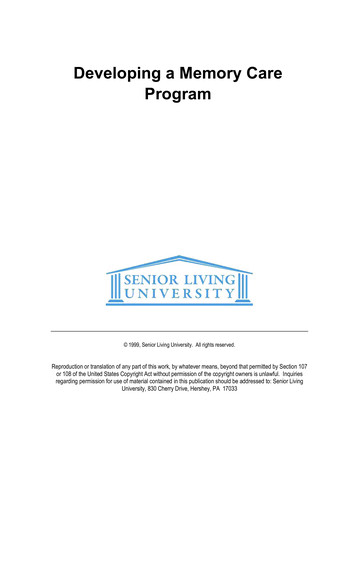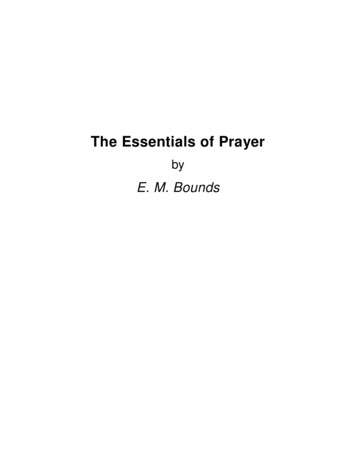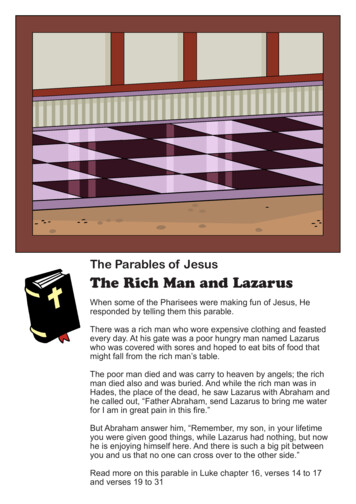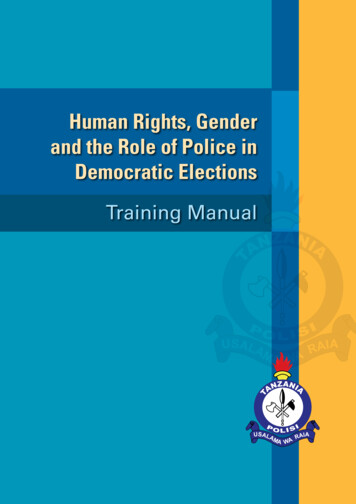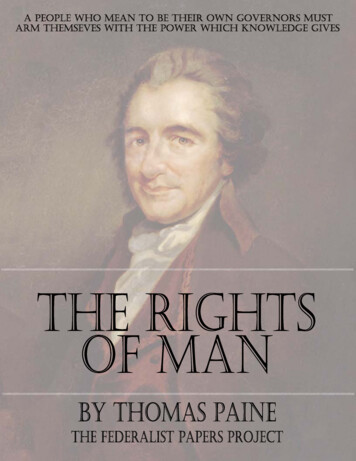
Transcription
THE RIGHTS OF MANBy Thomas PaineThe Federalist Papers Projectwww.thefederalistpapers.org
The Rights of Man by Thomas PaineTABLE OF CONTENTSPREFACE to the ENGLISH EDITION. . 3RIGHTS OF MAN . 5DECLARATION of the RIGHTS OF MAN and OF CITIZENS, By the National Assembly of France. . 52OSBERVATIONS on the DECLARATION OF RIGHTS. . 54MISCELLANEOUS CHAPTER. . 56CONCLUSION. . 71www.thefederalistpapers.orgPage 2
The Rights of Man by Thomas PainePREFACE to the ENGLISH EDITION.FROM the part Mr. Burke took in the American Revolution, it was natural that I should considerhim a friend to mankind; and as our acquaintance commenced on that ground, it would havebeen more agreeable to me to have had cause to continue in that opinion, than to change it.At the time Mr. Burke made his violent speech last winter in the English Parliament against theFrench Revolution and the National Assembly, I was in Paris, and had written him, but a shorttime before, to inform him how prosperously matters were going on. Soon after this, I saw hisadvertisement of the Pamphlet he intended to publish: As the attack was to be made in alanguage but little studied, and less understood, in France, and as every thing suffers bytranslation, I promised some of the friends of the Revolution in that country, that whenever Mr.Burke’s Pamphlet came forth, I would answer it. This appeared to me the more necessary to bedone, when I saw the flagrant misrepresentations which Mr. Burke’s Pamphlet contains; and thatwhile it is an outrageous abuse on the French Revolution, and the principles of Liberty, it is animposition on the rest of the world.I am the more astonished and disappointed at this conduct in Mr. Burke, as (from thecircumstance I am going to mention), I had formed other expectations.I had seen enough of the miseries of war, to wish it might never more have existence in theworld, and that some other mode might befound out to settle the differences that shouldoccasionally arise in the neighbourhood of nations. This certainly might be done if Courts weredisposed to set honestly about it, or if countries were enlightened enough not to be made thedupes of Courts. The people of America had been bred up in the same prejudices against France,which at that time characterized the people of England, but experience and an acquaintance withthe French Nation have most effectually shown to the Americans the falsehood of thoseprejudices; and I do not believe that a more cordial and confidential intercourse exists betweenany two countries than between America and France.When I came to France in the Spring of 1787, the Archbishop of Thoulouse was then Minister,and at that time highly esteemed. I became much acquainted with the private Secretary of thatMinister, a man of an enlarged benevolent heart; and found, that his sentiments and my ownperfectly agreed with respect to the madness of war, and the wretched impolicy of two nations,like England and France, continually worrying each other, to no other end than that of a mutualincrease of burdens and taxes. That I might be assured I had not misunderstood him, nor he me, Iput the substance of our opinions into writing, and sent it to him; subjoining a request, that if Ishould see among the people of England, any disposition to cultivate a better understandingbetween the two nations than had hitherto prevailed, how far I might be authorized to say that thesame disposition prevailed on the part of France? He answered me by letter in the mostunreserved manner, and that not for himself only, but for the Minister, with whose knowledgethe letter was declared to be written.www.thefederalistpapers.orgPage 3
The Rights of Man by Thomas PaineI put this letter into the hands of Mr. Burke almost three years ago, and left it with him, where itstill remains; hoping, and at the same time naturally expecting, from the opinion I had conceivedof him, that he would find some opportunity of making a good use of it, for the purpose ofremoving those errors and prejudices, which two neighbouring nations, from the want ofknowing each other, had entertained, to the injury of both.When the French Revolution broke out, it certainly afforded to Mr. Burke an opportunity ofdoing some good, had he been disposed to it; instead of which, no sooner did he see the oldprejudices wearing away, than he immediately began sowing the seeds of a new inveteracy, as ifhe were afraid that England and France would cease to be enemies. That there are men in allcountries who get their living by war, and by keeping up the quarrels of Nations, is as shockingas it is true; but when those who are concerned in the government of a country, make it theirstudy to sow discord, and cultivate prejudices between Nations, it becomes the moreunpardonable.With respect to a paragraph in this Work alluding to Mr. Burke’s having a pension, the report hasbeen some time in circulation, at least two months; and as a person is often the last to hear whatconcerns him the most to know, I have mentioned it, that Mr. Burke may have an opportunity ofcontradicting the rumour, if he thinks proper.THOMAS PAINE.[Back to Table of Contents]www.thefederalistpapers.orgPage 4
The Rights of Man by Thomas PaineRIGHTS OF MANAMONG the incivilities by which nations or individuals provoke and irritate each other, Mr.Burke’s pamphlet on the French Revolution is an extraordinary instance. Neither the People ofFrance, nor the National Assembly, were troubling themselves about the affairs of England, orthe English Parliament; and why Mr. Burke should commence an unprovoked attack upon them,both in parliament and in public, is a conduct that cannot be pardoned on the score of manners,nor justified on that of policy.There is scarcely an epithet of abuse to be sound in the English language, with which Mr. Burkehas not loaded the French Nation and the National Assembly. Every thing which rancour,prejudice, ignorance, or knowledge could suggest, are poured forth in the copious fury of nearfour hundred pages. In the strain and on the plan Mr. Burke was writing, he might have writtenon to as many thousands. When the tongue or the pen is let loose in a frenzy of passion, it is theman, and not the subject, that becomes exhausted.Hitherto Mr. Burke has been mistaken and disappointed in the opinions he had formed of theaffairs of France; but such is the ingenuity of his hope, or the malignancy of his despair, that itfurnishes him with new pretences to go on. There was a time when it was impossible to makeMr. Burke believe there would be any revolution in France. His opinion then was, that theFrench had neither spirit to undertake it, nor fortitude to support it; and now that there is one, heseeks an escape, by condemning it.Not sufficiently content with abusing the National Assembly, a great part of his work is taken upwith abusing Dr. Price (one of the best-hearted men that lives), and the two societies in Englandknown by the name of the Revolution Society, and the Society for Constitutional Information.Dr. Price had preached a sermon on the 4th of November 1789, being the anniversary of what iscalled in England, the Revolution which took place 1688. Mr. Burke, speaking of this sermon,says, ‘The Political Divine proceeds dogmatically to assert, that, by the principles of theRevolution, the people of England have acquired three fundamental rights: 1. To choose our own governors.2. To cashier them for misconduct.3. To frame a government for ourselves.’Dr. Price does not say that the right to do these things exists in this or in that person, or in this orin that description of persons, but that it exists in the whole; that it is a right resident in thenation.—Mr. Burke, on the contrary, denies that such a right exists in the nation, either in wholeor in part, or that it exists any where; and, what is still more strange and marvellous, he says,‘that the people of England utterly disclaim such a right, and that they will resist the practicalassertion of it with their lives and fortunes.’ That men should take up arms, and spend their liveswww.thefederalistpapers.orgPage 5
The Rights of Man by Thomas Paineand fortunes, not to maintain their rights, but to maintain they have not rights, is an entire newspecies of discovery, and suited to the paradoxial genius of Mr. Burke.The method which Mr. Burke takes to prove that the people of England have no such rights, andthat such rights do not now exist in the nation, either in whole or in part, or any where at all, is ofthe same marvellous and monstrous kind with what he has already said; for his arguments are,that the persons, or the generation of persons, in whom they did exist, are dead, and with themthe right is dead also. To prove this, he quotes a declaration made by parliament about a hundredyears ago, to William and Mary, in these words: “The Lords Spiritual and Temporal, andCommons, do, in the name of the people aforesaid,—(meaning the people of England thenliving)—most humbly and faithfully submit themselves, their heirs and posterities, for ever.” Healso quotes a clause of another act of parliament made in the same reign, the terms of which, hesays, “binds us—(meaning the people of that day)—our heirs, and our posterity, to them, theirheirs and posterity, to the end of time.”Mr. Burke conceives his point sufficiently established by producing those clauses, which heenforces by saying that they exclude the right of the nation for ever: And not yet content withmaking such declarations, repeated over and over again, he further says, ‘that if the people ofEngland possessed such a right before the Revolution, (which he acknowledges to have been thecase, not only in England, but throughout Europe, at an early period), ‘yet that the English nationdid, at the time of the Revolution, most solemnly renounce and abdicate it, for themselves, andfor all their posterity, for ever.’As Mr. Burke occasionally applies the poison drawn from his horrid principles, (if it is not aprofanation to call them by the name of principles), not only to the English nation, but to theFrench Revolution and the National Assembly, and charges that august, illuminated andilluminating body of men with the epithet of usurpers, I shall, sans ceremonie, place anothersystem of principles in opposition to his.The English Parliament of 1688 did a certain thing, which, for themselves and their constituents,they had a right to do, and which it appeared right should be done: But, in addition to this right,which they possessed by delegation, they set up another right by assumption, that of binding andcontrouling posterity to the end of time. The case, therefore, divides itself into two parts; theright which they possessed by delegation, and the right which they set up by assumption. Thefirst is admitted; but, with respect to the second, I reply—There never did, there never will, and there never can exist a parliament, or any description ofmen, or any generation of men, in any country, possessed of the right or the power of bindingand controuling posterity to the “end of time,” or of commanding for ever how the world shall begoverned, or who shall govern it; and therefore, all such clauses, acts or declarations, by whichthe makers of them attempt to do what they have neither the right nor the power to do, nor thepower to execute, are in themselves null and void.—Every age and generation must be as free toact for itself, in all cases, as the ages and generations which preceded it. The vanity andwww.thefederalistpapers.orgPage 6
The Rights of Man by Thomas Painepresumption of governing beyond the grave, is the most ridiculous and insolent of all tyrannies.Man has no property in man; neither has any generation a property in the generations which areto follow. The parliament or the people of 1688, or of any other period, had no more right todispose of the people of the present day, or to bind or to controul them in any shape whatever,than the parliament or the people of the present day have to dispose of, bind or controul thosewho are to live a hundred or a thousand years hence. Every generation is, and must be,competent to all the purposes which its occasions require. It is the living, and not the dead, thatare to be accommodated. When man ceases to be, his power and his wants cease with him; andhaving no longer any participation in the concerns of this world, he has no longer any authorityin directing who shall be its governors, or how its government shall be organized, or howadministered.I am not contending for nor against any form of government, nor for nor against any party hereor elsewhere. That which a whole nation chooses to do, it has a right to do. Mr. Burke says, No.Where then does the right exist? I am contending for the rights of the living, and against theirbeing willed away, and controuled and contracted for, by the manuscript assumed authority ofthe dead; and Mr. Burke is contending for the authority of the dead over the rights and freedomof the living. There was a time when kings disposed of their crowns by will upon theirdeathbeds, and consigned the people, like beasts of the field, to whatever successor theyappointed. This is now so exploded as scarcely to be remembered, and so monstrous as hardly tobe believed: But the parliamentary clauses upon which Mr. Burke builds his political church, areof the same nature.The laws of every country must be analogous to some common principle. In England, no parentor master, nor all the authority of parliament, omnipotent as it has called itself, can bind orcontroul the personal freedom even of an individual beyond the age of twenty-one years: Onwhat ground of right, then, could the parliament of 1688, or any other parliament, bind allposterity for ever?Those who have quitted the world, and those who are not yet arrived at it, are as remote fromeach other, as the utmost stretch of mortal imagination can conceive: What possible obligation,then, can exist between them; what rule or principle can be laid down, that two non-entities, theone out of existence, and the other not in, and who never can meet in this world, that the oneshould controul the other to the end of time?In England, it is said that money cannot be taken out of the pockets of the people without theirconsent: But who authorized, or who could authorize the parliament of 1688 to controul and takeaway the freedom of posterity, and limit and confine their right of acting in certain cases forever, who were not in existence to give or to withhold their consent?A greater absurdity cannot present itself to the understanding of man, than what Mr. Burke offersto his readers. He tells them, and he tells the world to come, that a certain body of men, whoexisted a hundred years ago, made a law; and that there does not now exist in the nation, nor everwww.thefederalistpapers.orgPage 7
The Rights of Man by Thomas Painewill, nor ever can, a power to alter it. Under how many subtilties, or absurdities, has the divineright to govern been imposed on the credulity of mankind! Mr. Burke has discovered a new one,and he has shortened his journey to Rome, by appealing to the power of this insallible parliamentof former days; and he produces what it has done, as of divine authority: for that power mustcertainly be more than human, which no human power to the end of time can alter.But Mr. Burke has done some service, not to his cause, but to his country, by bringing thoseclauses into public view. They serve to demonstrate how necessary it is at all times to watchagainst the attempted encroachment of power, and to prevent its running to excess. It issomewhat extraordinary, that the offence for which James II. was expelled, that of setting uppower by assumption, should be re-acted, under another shape and form, by the parliament thatexpelled him. It shews, that the rights of man were but imperfectly understood at the Revolution;for, certain it is, that the right which that parliament set up by assumption (for by delegation ithad it not, and could not have it, because none could give it) over the persons and freedom ofposterity for ever, was of the same tyrannical unsounded kind which James attempted to set upover the parliament and the nation, and for which he was expelled. The only difference is, (for inprinciple they differ not), that the one was an usurper over the living, and the other over theunborn; and as the one has no better authority to stand upon than the other, both of them must beequally null and void, and of no effect.From what, or from whence, does Mr. Burke prove the right of any human power to bindposterity for ever? He has produced his clauses; but he must produce also his proofs, that such aright existed, and shew how it existed. If it ever existed, it must now exist; for whateverappertains to the nature of man, cannot be annihilated by man. It is the nature of man to die, andhe will continue to die as long as he continues to be born. But Mr. Burke has set up a sort ofpolitical Adam, in whom all posterity are bound for ever; he must therefore prove that his Adampossessed such a power, or such a right.The weaker any cord is, the less will it bear to be stretched, and the worse is the policy to stretchit, unless it is intended to break it. Had a person contemplated the overthrow of Mr. Burke’spositions, he would have proceeded as Mr. Burke has done. He would have magnified theauthorities, on purpose to have called the right of them into question; and the instant the questionof right was started, the authorities must have been given up.It requires but a very small glance of thought to perceive, that altho’ laws made in one generationoften continue in force through succeeding generations, yet that they continue to derive theirforce from the consent of the living. A law not repealed continues in force, not because it cannotbe repealed, but because it is not repealed; and the non-repealing passes for consent.But Mr. Burke’s clauses have not even this qualification in their favour. They become null, byattempting to become immortal. The nature of them precludes consent. They destroy the rightwhich they might have, by grounding it on a right which they cannot have. Immortal power isnot a human right, and therefore cannot be a right of parliament. The parliament of 1688 mightwww.thefederalistpapers.orgPage 8
The Rights of Man by Thomas Paineas well have passed an act to have authorized themselves to live for ever, as to make theirauthority live for ever. All therefore that can be said of them is, that they are a formality ofwords, of as much import, as if those who used them had addressed a congratulation tothemselves, and, in the oriental stile of antiquity, had said, O Parliament, live for ever!The circumstances of the world are continully changing, and the opinions of men change also;and as government is for the living, and not for the dead, it is the living only that has any right init. That which may be thought right and found convenient in one age, may be thought wrong andfound inconvenient in another. In such cases, Who is to decide, the living, or the dead?As almost one hundred pages of Mr. Burke’s book are employed upon these clauses, it willconsequently follow, that if the clauses themselves, so far as they set up an assumed, usurpeddominion over posterity for ever, are unauthoritative, and in their nature null and void; that allhis voluminous inferences and declamation drawn therefrom, or founded thereon, are null andvoid also: and on this ground I rest the matter.We now come more particularly to the affairs of France. Mr. Burke’s book has the appearance ofbeing written as instruction to the French nation; but if I may permit myself the use of anextravagant metaphor, suited to the extravagance of the case, It is darkness attempting toilluminate light.While I am writing this, there are accidentally before me some proposals for a declaration ofrights by the Marquis de la Fayette (I ask his pardon for using his former address, and do it onlyfor distinction’s sake) to the National Assembly, on the 11th of July 1789, three days before thetaking of the Bastille; and I cannot but be struck by observing how opposite the sources are fromwhich that Gentleman and Mr. Burke draw their principles. Instead of referring to musty recordsand mouldy parchments to prove that the rights of the living are lost, “renounced and abdicatedfor ever,” by those who are now no more, as Mr. Burke has done, M. de la Fayette applies to theliving world, and emphatically says, “Call to mind the sentiments which Nature has engraved inthe heart of every citizen, and which take a new force when they are solemnly recognized byall:—For a nation to love liberty, it is sufficient that she knows it; and to be free, it is sufficientthat she wills it.” How dry, barren, and obscure, is the source from which Mr. Burke labours! andhow ineffectual, though gay with flowers, are all his declamation and his argument, comparedwith these clear, concise, and soul-animating sentiments! Few and short as they are, they lead onto a vast field of generous and manly thinking, and do not finish, like Mr. Burke’s periods, withmusic in the ear, and nothing in the heart.As I have introduced M. de la Fayette, I will take the liberty of adding an anecdote respecting hisfarewel address to the Congress of America in 1783, and which occurred fresh to my mind whenI saw Mr. Burke’s thundering attack on the French Revolution.—M. de la Fayette went toAmerica at an early period of the war, and continued a volunteer in her service to the end. Hisconduct through the whole of that enterprise is one of the most extraordinary that is to be foundin the history of a young man, scarcely then twenty years of age. Situated in a country that waswww.thefederalistpapers.orgPage 9
The Rights of Man by Thomas Painelike the lap of sensual pleasure, and with the means of enjoying it, how few are there to be foundwho would exchange such a scene for the woods and wildernesses of America, and pass theflowery years of youth in unprofitable danger and hardship! but such is the fact. When the warended, and he was on the point of taking his final departure, he presented himself to Congress,and contemplating, in his affectionate farewel, the revolution he had seen, expressed himself inthese words: “May this great monument, raised to Liberty, serve as a lesson to the oppressor,and an example to the oppressed!”—When this address came to the hands of Doctor Franklin,who was then in France, he applied to Count Vergennes to have it inserted in the French Gazette,but never could obtain his consent. The fact was, that Count Vergennes was an aristocraticaldespot at home, and dreaded the example of the American revolution in France, as certain otherpersons now dread the example of the French revolution in England; and Mr. Burke’s tribute offear (for in this light his book must be considered) runs parallel with Count Vergennes’ refusal.But, to return more particularly to his work—“We have seen (says Mr. Burke) the French rebel against a mild and lawful Monarch, with morefury, outrage, and insult, than any people has been known to rise against the most illegal usurper,or the most sanguinary tyrant.”—This is one among a thousand other instances, in which Mr.Burke shews that he is ignorant of the springs and principles of the French revolution.It was not against Louis the XVIth, but against the despotic principles of the government, that thenation revolted. These principles had not their origin in him, but in the original establishment,many centuries back; and they were become too deeply rooted to be removed, and the augeanstable of parasites and plunderers too abominably filthy to be cleansed, by any thing short of acomplete and universal revolution. When it becomes necessary to do a thing, the whole heart andsoul should go into the measure, or not attempt it. That crisis was then arrived, and thereremained no choice but to act with determined vigour, or not to act at all. The king was known tobe the friend of the nation, and this circumstance was favourable to the enterprise. Perhaps noman bred up in the stile of an absolute King, ever possessed a heart so little disposed to theexercise of that species of power as the present King of France. But the principles of thegovernment itself still remained the same. The Monarch and the Monarchy were distinct andseparate things; and it was against the established despotism of the latter, and not against theperson or principles of the former, that the revolt commenced, and the revolution has beencarried.Mr. Burke does not attend to the distinction between men and principles; and therefore, he doesnot see that a revolt may take place against the despotism of the latter, while there lies no chargeof despotism against the former.The natural moderation of Louis XVI. contributed nothing to alter the hereditary despotism ofthe monarchy. All the tyrannies of former reigns, acted under that hereditary despotism, werestill liable to be revived in the hands of a successor. It was not the respite of a reign that wouldsatisfy France, enlightened as she was then become. A casual discontinuance of the practice ofdespotism, is not a discontinuance of its principles; the former depends on the virtue of thewww.thefederalistpapers.orgPage 10
The Rights of Man by Thomas Paineindividual who is in immediate possession of the power; the latter, on the virtue and fortitude ofthe nation. In the case of Charles I. and James II. of England, the revolt was against the personaldespotism of the men; whereas in France, it was against the hereditary despotism of theestablished government. But men who can consign over the rights of posterity for ever on theauthority of a mouldy parchment, like Mr. Burke, are not qualified to judge of this revolution. Ittakes in a field too vast for their views to explore, and proceeds with a mightiness of reason theycannot keep pace with.But there are many points of view in which this revolution may be considered. When despotismhas established itself for ages in a country, as in France, it is not in the person of the King onlythat it resides. It has the appearance of being so in show, and in nominal authority; but it is not soin practice, and in fact. It has its standard every-where. Every office and department has itsdespotism, founded upon custom and usage. Every place has its Bastille, and every Bastille itsdespot. The original hereditary despotism resident in the person of the King, divides andsubdivides itself into a thousand shapes and forms, till at last the whole of it is acted bydeputation. This was the case in France; and against this species of despotism, proceeding onthrough an endless labyrinth of office till the source of it is scarcely perceptible, there is no modeof redress. It strengthens itself by assuming the appearance of duty, and tyrannises under thepretence of obeying.When a man reflects on the condition which France was in from the nature of her government, hewill see other causes for revolt than those which immediately connect themselves with the personor character of Louis XVI. There were, if I may so express it, a thousand despotisms to bereformed in France, which had grown up under the hereditary despotism of the monarchy, andbecame so rooted as to be in a great measure independent of it. Between the monarchy, theparliament, and the church, there was a rivalship of despotism; besides the feudal despotismoperating locally, and the ministerial despotism operating every-where. But Mr. Burke, byconsidering the King as the only possible object of a revolt, speaks as if France was a village, inwhich every thing that passed must be known to its commanding officer, and no oppressioncould be acted but what he could immediately controul. Mr. Burke might have been in theBastille his whole life, as well under Louis XVI. as Louis XIV. and neither the one nor the otherhave known that such a man as Mr. Burke existed. The despotic principles of the governmentwere the same in both reigns, though the dispositions of the men were as remote as tyranny andbenevolence.What Mr. Burke considers as a reproach to the French Revolution (that of bringing it forwardunder a reign more mild than the preceding ones), is one of its highest honours. The revolutionsthat have taken place in other European countries, have been excited by personal hatred. Therage was against the man, and he became the victim. But, in the instance of France, we see arevolution generated in the rational contemplation of the rights of man, and distinguishing fromthe beginning between persons and principles.www.thefederalistpapers.orgPage 11
The Rights of Man by Thomas PaineBut Mr. Burke appears to have no idea of principles, when he is contemplating governments.“Ten years ago (says he) I could have felicitated France on her having a government, withoutenquiring what the nature of that government was, or how it was administered.” Is this thelanguage of a rationable man? Is it the language of a heart feeling as it ought to feel for the rightsand happiness of the human race? On this ground, Mr. Burke must compliment everygovernment in the world, while the victims who suffer under them, whether sold into slavery, ortortured out of existence, are wholly forgotten. It is p
The Rights of Man by Thomas Paine www.thefederalistpapers.org Page 6 and fortunes, not to maintain their rights, but to maintain they have not rights, is an entire new species of dis

